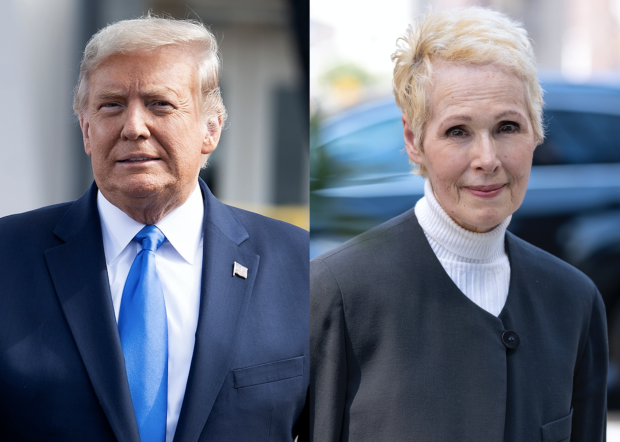The woman who accused former President Donald Trump of raping her in the 1990s in New York City when he was a real estate developer said in a letter made public on Tuesday that she plans to file a sexual battery lawsuit under the state’s new Adult Survivors Act.
Roberta Kaplan, an attorney for journalist E. Jean Carroll, wrote in the Aug. 8 letter that Carroll plans to file a lawsuit on Nov. 24, when New York’s Adult Survivors Act goes into effect. Under the new law, between Nov. 24 this year and Nov. 23, 2023, accusers can file civil lawsuits alleging sexual misconduct — regardless of when the alleged misconduct occurred.
Carroll has already filed a defamation claim against Trump, and Kaplan proposed in the letter that the planned Adult Survivors Act claim and that suit be tried together in February 2023. According to the letter, Carroll plans to sue Trump for sexual battery and “intentional infliction of emotional distress,” Kaplan wrote.
Trump has denied raping Carroll. Carroll is suing him for defamation for comments he made in 2019 while president, alleging that she is “totally lying” about the assault to sell a memoir, and said “she’s not my type.”
President Trump / BRENDAN SMIALOWSKI/AFP via Getty Images; E. Jean Carroll: AP Photo/Craig Ruttle
Trump’s attorney, Alina Hobba, responded in an Aug. 11 letter that the former president “wholly and adamantly objects” to combining the claims, and wrote that “two additional causes of action-namely, battery and intentional infliction of emotional distress-would be extraordinarily prejudicial.”
Kaplan wrote that “discovery in the above-referenced defamation case has been entirely one way.” Kaplan said Carroll is “prepared to produce 30,267 pages of material responsive to Defendant’s documents requests” and she has already provided “substantive responses” to 19 inquiries.
Kaplan alleged Trump has “barely participated in the discovery process at all.” Kaplan wrote that she initially did not think they would need a deposition from Trump, but that a “deposition now appears to be the only way to do so, especially since we seek to avoid further delay.”
Hobba said in response that Kaplan “repeatedly mischaracterizes the discovery efforts that have been undertaken by the parties to date” in the initial lawsuit. Hobba also defended the former president’s claims that “privileges asserted by Defendant- executive privilege, deliberative process privilege, attorney-client privilege, etc. -are applicable in each instance.”
“For example, the presidential communications privilege is a well-established doctrine that has been recognized as a ‘presumptive privilege for Presidential communications’ that are ‘fundamental to the operation of government and inextricably rooted in the separation of powers under the Constitution,'” Hobbs wrote.
The extent of the privilege is now at issue in Trump’s federal lawsuit in Florida.
Trump has also claimed that executive privilege should protect the classified records that were seized at his Mar-a-Lago residence when the FBI executed a search warrant on Aug. 8. Executive privilege is a constitutional doctrine based on the separation of powers, and it gives the president the right to shield his deliberations with aides from the congressional and judicial branches in some cases.
The Supreme Court previously rejected Trump’s attempt to use executive privilege to shield records from the House committee investigating the Jan. 6 attack on the U.S. Capitol. President Joe Biden had previously said the documents sought by the committee were not subject to executive privilege.
